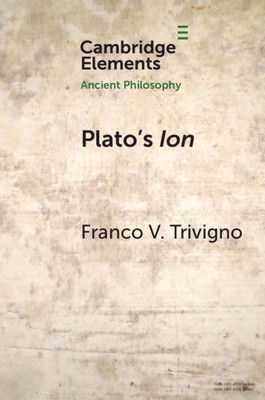
- We will send in 10–14 business days.
- Author: Franco V Trivigno
- Publisher: Cambridge University Press
- ISBN-10: 1108713459
- ISBN-13: 9781108713450
- Format: 15.2 x 22.9 x 0.4 cm, softcover
- Language: English
- SAVE -10% with code: EXTRA
Reviews
Description
This Element defends an interpretation of Plato's Ion on which its primary concern is with audience reception of poetry. The dialogue countenances and rejects two models of poetic reception, the expertise model and the inspiration model, both of which make the audience entirely passive in relation to poetry; and it presents the character of Ion as a comedic figure, a self-ignorant fool whose foolishness is a function of his passive relation to Homer. In the end, this Element argues that, for Plato, critical engagement is the proper way for audiences to treat poetry. This view holds open the possibility that poetry may express some truths without thereby endorsing the idea that poets are experts who have authoritative knowledge.
EXTRA 10 % discount with code: EXTRA
The promotion ends in 14d.20:59:48
The discount code is valid when purchasing from 10 €. Discounts do not stack.
- Author: Franco V Trivigno
- Publisher: Cambridge University Press
- ISBN-10: 1108713459
- ISBN-13: 9781108713450
- Format: 15.2 x 22.9 x 0.4 cm, softcover
- Language: English English
This Element defends an interpretation of Plato's Ion on which its primary concern is with audience reception of poetry. The dialogue countenances and rejects two models of poetic reception, the expertise model and the inspiration model, both of which make the audience entirely passive in relation to poetry; and it presents the character of Ion as a comedic figure, a self-ignorant fool whose foolishness is a function of his passive relation to Homer. In the end, this Element argues that, for Plato, critical engagement is the proper way for audiences to treat poetry. This view holds open the possibility that poetry may express some truths without thereby endorsing the idea that poets are experts who have authoritative knowledge.


Reviews